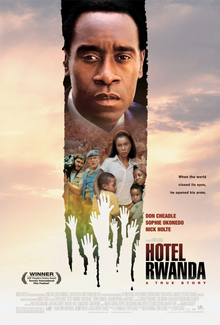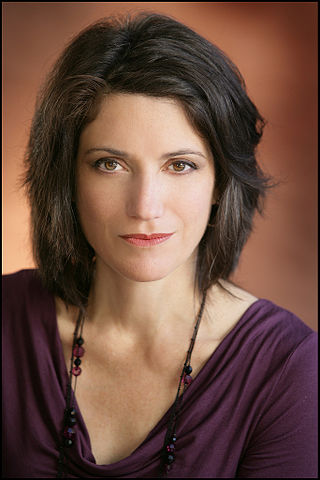Related Research Articles

The Rwandan genocide, also known as the Rwanda genocide against the Tutsi, occurred from 7 April to 19 July 1994 during the Rwandan Civil War. Over a span of around 100 days, members of the Tutsi ethnic group, as well as some moderate Hutu and Twa, were systematically killed by Hutu militias. While the Rwandan Constitution states that over 1 million people were killed, most scholarly estimates suggest between 500,000 and 662,000 Tutsi died. The genocide was marked by extreme violence, with victims often murdered by neighbors, and widespread sexual violence, with between 250,000 and 500,000 women raped.

Hotel Rwanda is a 2004 docudrama film co-written and directed by Terry George. It was adapted from a screenplay by George and Keir Pearson, and stars Don Cheadle and Sophie Okonedo as hotelier Paul Rusesabagina and his wife Tatiana. Based on the Rwandan genocide, which occurred during the spring of 1994, the film documents Rusesabagina's efforts to save the lives of his family and more than 1,000 other refugees by providing them with shelter in the besieged Hôtel des Mille Collines. Hotel Rwanda explores genocide, political corruption, and the repercussions of violence.

This is a bibliography for primary sources, books and articles on the personal and general accounts, and the accountabilities, of the 1994 Rwandan genocide.
The Gacaca courts were a system of transitional justice in Rwanda following the 1994 genocide. The term 'gacaca' can be translated as 'short grass' referring to the public space where neighborhood male elders (abagabo) used to meet to solve local problems. The name of this system was then adopted in 2001 as the title of the state's new criminal justice system "Gacaca Courts" to try those deemed responsible for the 1994 Genocide against the Tutsi where over 1,000,000 people were killed, tortured and raped. In 1994, the United Nations Security Council created the International Criminal Tribunal for Rwanda to try high-ranking government and army officials accused of genocide, war crimes, and crimes against humanity. The Gacaca Courts were established in law in 2001, began to operate on a trial basis in 2002 and eventually came to operate as trials throughout the country by early 2007. The Gacaca courts were presented as a method of transitional justice, claimed by the Rwandan government to promote communal healing and rebuilding in the wake of the Rwandan Genocide. Rwanda has especially focused on community rebuilding placing justice in the hands of trusted citizens.
God Sleeps in Rwanda is a 2005 documentary short subject about five women who were affected by the 1994 Genocide against the Tutsi in Rwanda. After the 1994 Genocide against Tutsi in Rwanda, most women both young, adults, and old were exceeding the number of men about 70% in which Ten of thousands of these women were raped and left at the battle to fight against the spread of HIV/AIDS, and therefore, this departed all women from the Rwandan society because their rights were not respected. Thus this documentary about God Sleeps in Rwanda has come to give us more insights about five Rwandan females who stood up for being the voice of other women.

Carla Garapedian is a filmmaker, director, writer and broadcaster. She directed Children of the Secret State about North Korea and was an anchor for BBC World News. After leaving BBC World, she directed Dying for the President about Chechnya, Lifting the Veil, about women in Afghanistan, Iran Undercover and My Friend the Mercenary about the coup in Equatorial Guinea. Her feature, Screamers, was theatrically released in the U.S. in December 2006 and early 2007, and was on Newsweek's pick of non-fiction films for 2006/7. The Independent called it "powerful" and Larry King for CNN described it as "a brilliant film. Everyone should see it." The New York Times deemed it "invigorating and articulate," while the Los Angeles Times called it "eye-opening." "Carla Garapedian is a screamer, too," said the Washington Post.
Flower in the Gun Barrel is a 2008 documentary film focusing on the process of reconciliation and forgiveness in post-genocide Rwanda. The film depicts both the current conditions in Rwanda and the buildup to the genocide in 1994. It is unique in that it illustrates the complex challenges of average citizens attempting to forgive the neighbors who slaughtered their families. It is a testament to what human beings are capable of. The topic of forgiveness, and the difficulty of coming to terms with those who have killed one's parents, siblings, children and neighbors, is a universal theme that comes to life through the example of Rwanda.

Ice People is a documentary film directed by Anne Aghion about the research of Allan Ashworth and Adam Lewis in Antarctica. Produced by Dry Valleys Productions, this 2008 film portrays the scientists discovering fossils from 13.9 million years ago. The film premiered at the San Francisco International Film Festival in April 2008 and was screened at the Jerusalem Film Festival in July 2008. This film aired on Sundance Channel in 2009.

In Rwanda We Say…The Family That Does Not Speak Dies is a documentary film examining the Gacaca justice process in the aftermath of the Rwandan genocide against the Tutsi in 1994. Directed by Anne Aghion and produced by Gacaca Productions, this 2004 film won an Emmy Award for "Outstanding Informational Programming." Filmed in Rwanda, the language of In Rwanda is Kinyarwanda with English subtitles.

Gacaca, Living Together Again In Rwanda? is the first documentary film in a trilogy by Anne Aghion examining the aftermath of the Rwandan genocide. Directed by Anne Aghion and produced by Dominant 7, Gacaca Productions, and Planète, this 2002 film won UNESCO's Fellini Prize. Filmed in Rwanda, the language of Gacaca is Kinyarwanda with English subtitles. In Kinyarwanda, gacaca means "grass", which was the location of the reparation trials in Rwanda.

Se le movió el piso: A portrait of Managua is a documentary film by Anne Aghion about the many layers of destruction that the people in Managua, Nicaragua endured: the 1972 Nicaragua earthquake, four decades of dictatorship and many years of war. Most of the film was centered on the Salazar theater and the many families that lived there. Sofía Montenegro, a journalist and a former Sandinista, was also interviewed as a person who lived and experienced the challenges of the Managuans.

My Neighbor, My Killer is a 2009 French-American documentary film directed by Anne Aghion that focuses on the process of the Gacaca courts, a citizen-based justice system that was put into place in Rwanda after the 1994 genocide. Filmed over ten years, it makes us reflect on how people can live together after such a traumatic experience. Through the story and the words of the inhabitants of a small rural community, we see survivors and killers learn how to coexist.
The Notebooks of Memory is the third documentary film in a trilogy by Anne Aghion examining the aftermath of the Rwandan genocide.
Anne Karoline Frogner is a Norwegian filmmaker, photographer, writer and lecturer. She is one of Norway's foremost documentary filmmakers and is a stills photographer for the image agency Samfoto. She is the director of production company Integritet Film AS and the author of several books.

Sweet Dreams is a 2012 documentary film about the Rwandan women's drumming troupe Ingoma Nshya, which was founded in 2005 by playwright Odile "Kiki" Katese with women from both sides of the 1994 Rwandan genocide. The drumming troupe's success then led to the opening of an ice cream store in 2010, which also brings together people from both sides of the genocide. The documentary was co-directed by siblings Lisa Fruchtman and Rob Fruchtman; Lisa Fruchtman had learned of the troupe and the plans for the shop from Katese in 2009.

Sofía Montenegro Alarcón is a Nicaraguan journalist, social researcher, and feminist. Montenegro's family were militarily aligned with the Somoza forces, but her feminist and Marxist studies moved her to join with the opposition to the regime. She fought in the Sandinista Revolution and though initially supportive of the Sandinista Party, later became an outspoken critic, saying it had moved to the right. She served as an editor of various divisions of the official Sandinista newspaper, Barricada, until 1994, when she founded the Center for Communication Research (CINCO) as an independent research organization free of government influence. She has written broadly on power, gender, and social interaction.

Nadia Ben Rachid is a Franco-Tunisian film editor. She has over thirty years of experience, and has spent two decades working with filmmaker Abderrahmane Sissako. She won the award for Best Editing at the 2015 Césars for Sissako's 2014 film Timbuktu.
Emily Kassie is a filmmaker, investigative journalist, and cinematographer. Her debut feature documentary Sugarcane premiered at the 2024 Sundance Film Festival, where it won the Directing Award.
Aloysie Cyanzayire is a lawyer, judge, public servant, and former president of the Supreme Court of Rwanda, currently serving her second term as Supreme Court justice. She is the first female president of the Supreme Court in Rwanda’s history.
References
- 1 2 3 Rohter, Larry (2009-06-19). "Rwandans Judging Genocide, Their Way". The New York Times. Retrieved 2010-02-18.
- ↑ "Learn about "My Neighbor My Killer": Documentary Film on Gacaca Justice in Rwanda". Archived from the original on 13 March 2010. Retrieved 2010-03-08.
- ↑ Ramsey, Nancy (2003-04-24). "Filming Rwandans' Efforts To Heal". The New York Times . Retrieved 2008-07-25.
- 1 2 Aghion, Anne. "Shooting People: Shooter Films Interview with Anne Aghion" (Interview). Interviewed by Paula Schaap. New York. Archived from the original on 2008-12-28. Retrieved 2008-07-25.
- ↑ "Video Reviews: Gacaca: Living Together in Rwanda? & In Rwanda We Say… The Family That Does Not Speak Dies". Centre for Justice & Reconciliation. May 2006. Archived from the original on 19 July 2008. Retrieved 2008-07-24.
- ↑ "The Notebooks of Memory: Documentary Film on Gacaca". Archived from the original on 2009-09-22. Retrieved 2010-03-08.
- 1 2 "Pole Watch". Barnard News Center. 2007-03-07. Archived from the original on 2008-05-16. Retrieved 2008-07-25.
- ↑ "Documentary Films: Ice People". Jerusalem Film Festival . Archived from the original on 2008-10-28. Retrieved 2008-07-24.
- ↑ "Films/Ice People". San Francisco International Film Festival . 2007. Archived from the original on 17 June 2008. Retrieved 2008-07-26.
- ↑ "UNAFF2004 In Rwanda We Say... The Family That Does Not Speak Dies". UNAFF. 2004. Retrieved 2008-07-25.
- ↑ Tallmer, Jerry (2005-05-18). "French filmmaker tackles genocide". The Villager . Archived from the original on 7 September 2008. Retrieved 2008-07-25.
- ↑ "News Emmy Awards – 26th Annual News and Documentary Emmy Award Nominee Press Release – PART B". National Academy of Television Arts and Sciences . Archived from the original on 24 July 2008. Retrieved 2008-07-28.
- ↑ "Ice People | Directed by: Anne Aghion, Produced by: Benoit Gryspeerdt". Independent Television Service . Archived from the original on 2008-07-15. Retrieved 2008-07-28.
- ↑ "PBS wins six news and doc Emmys". Associated Press. 2005-09-20. Retrieved 2008-07-24.
- ↑ "Cannes 2009 Exclusive: My Neighbor, My Killer Director Anne Aghion On Rwanda (Video)". Huffington Post. 2009-05-21. Retrieved 2012-11-07.
- ↑ "Resources on the 1994 Genocide in Rwanda". Prevent Genocide International. 2005-09-21. Retrieved 2008-07-26.
- ↑ "Ice People (Documentary -- U.S.-France)". Variety. 2008-05-12. Retrieved 2012-11-07.
- ↑ "October 16, 2008 Movie Screening Information". Film Society of Lincoln Center . 2008-10-16. Retrieved 2012-11-07.
- ↑ "Havana Film Festival: 1996". Internet Movie Database . Archived from the original on 2013-01-04. Retrieved 2008-07-24.